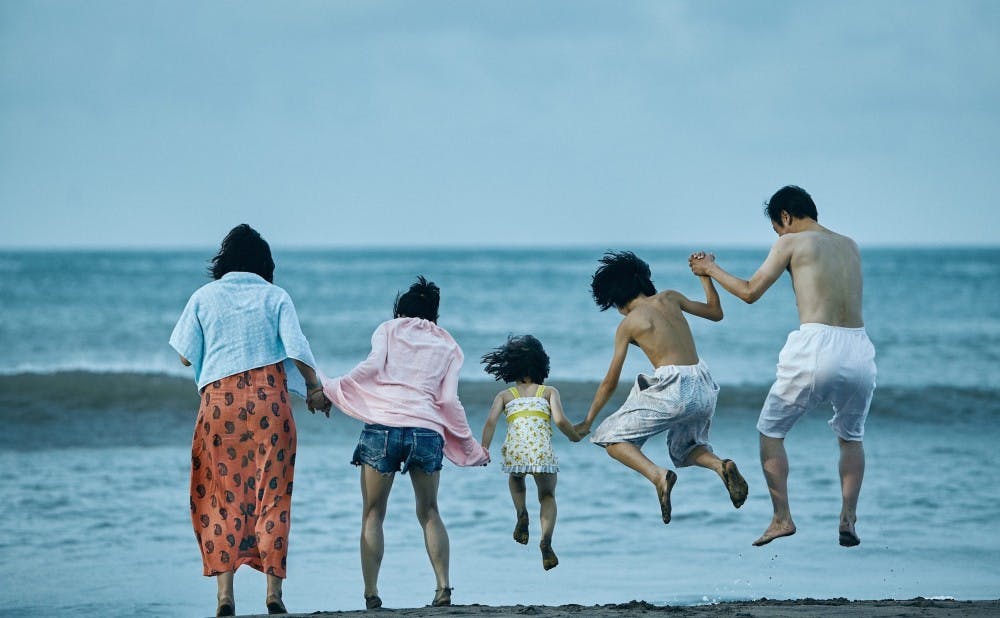“Shoplifters” is a delicate and atmospheric portrait of family life that has garnered a well-earned renown as one of the best foreign films of 2018.
The Japanese film, directed by Hirokazu Kore-eda, traces the dynamics of a ragtag family tied together by circumstance rather than by blood. Although the father, mother and older sister figures work outside the home, they must supplement their meager working-class incomes with occasional bouts of shoplifting, a skill passed from father to child with the gravity of an heirloom. Kore-eda refuses to pass any firm moral judgement on the intricate workings of this family: He rebuffs the twin poles of dysfunction and virtue with careful portraiture, allowing the viewer to get the whole picture before they can process the film’s full meaning.
Kore-eda’s perennial theme is picking apart family bonds and interrogating the social conventions that define and confine what “family” means. It is a topic that he brings to salience once again in “Shoplifters,” albeit in a context that lacks the heavy footprint of familial absence that his other films bear. After a grocery store shoplifting session, 10-year-old Shota (Kairi Jyo) and father-figure Osamu (Lily Franky) bring home a solemn, shivering five-year-old Juri (Miyu Sasaki), whom they found forlornly sitting outside of her home, her parents nowhere in sight. After Grandma (Kilin Kiki) rolls up Juri’s sleeves to reveal the scars lining her arms and Osamu’s attempt to return the girl home goes awry after witnessing her father’s violence second-hand, the family decides to unofficially adopt her. All is well in the homely hovel until Juri’s disappearance makes headlines, and the well-meaning but veritable kidnappers decide, upon minimal deliberation, to keep her, though this time they cut her hair and rechristen her “Lin.”
Kore-eda’s greatest talent is the delicacy and precision with which he crafts the atmosphere of a film, allowing scenes to flow one into another like a flower slowly blooming. The film’s gentle ebbs and flows make the viewer sensitive to the slightest touch, meaning that Kore-eda can infuse the climax with deeply-felt emotionality without having to rely on blatant shock or surprise. The energy of all but the last 30 minutes of the film is encapsulated in the interactions among the characters, as an omniscient and genial camera follows the family’s members throughout their respective days. Shota and Lin are rightly given their due despite their small statures, as Kore-eda simultaneously underscores the children’s vulnerabilities while allowing them to stand tall as their own entities. Shota, especially, is wise beyond his years, possessing both a strong sense of empathy and a keen predisposition to interrogate the morality of his own and other’s actions. Middle-aged Osamu and his partner Nobuyo (Sakura Andô) are tender, jovial and almost bashful with one another in a love scene that retains the lively yet warm tone of the overall film.
Certainly, Kore-eda endows the family with a sense of dignity without leaving any trace of virtue-signaling. The family’s shared warmth, which is kindled via the mutual respect between characters, is also tempered by a blunt pragmatism that is a clear result of a life spent combating poverty. It is where these two planes meet that Kore-eda works his magic best, managing to extract sincerity out of a life at the ragged edges of society. Some scenes retain the aesthetic of a Van Gogh painting: Although the family’s hovel is cluttered and cramped with its inhabitants squeezed between objects and each other, it emits a yellow glow that always seems to keep at bay the yawn of the blue night. The characters are surprisingly patient with one another, and especially with the children. Osamu negotiates with Shota as though the latter were much older than a mere 10-years-old, and some moments, such as when Nobuyo burns the clothes that Lin wore after escaping her abusive parents, carry the weight of symbolism and ceremonialism. Lin is ostensibly better off with her current family than she was with her former one, despite its recurrent struggles with poverty. Although Shota has the option to find his original parents, he chooses instead to stay with his makeshift ones. Kore-eda thereby challenges our basis for delineating a family, entreating the viewer to ask whether the bonds we forge ourselves might be any stronger and more enriching than the ones we are born into.
But Kore-eda is not content with merely extracting superficial integrity from this freewheeling family. Love and life at the margins become the vehicle for moral questioning. In the last quarter of the film, the delicate idyll that he has created is cracked open like an eggshell, and the family is revealed to be submerged more deeply in moral ambiguity than once thought. Little hints scattered like breadcrumbs throughout the film foreshadow the revelation that all is not as well as once thought in this cramped corner of paradise. Was it morally permissible for Osamu to encourage Shota to steal? Was Grandma more conniving and less loving than once thought? Did Nobuyo kidnap the children for a reason more nefarious than the sympathy in her heart? Once everything comes crashing down and a new equilibrium firmly stakes its ground, Kore-eda leaves his characters (and ourselves) in a morally gray area, reminding us that, if we are to be somewhat realist, there will be no easy answers.
Get The Chronicle straight to your inbox
Signup for our weekly newsletter. Cancel at any time.

